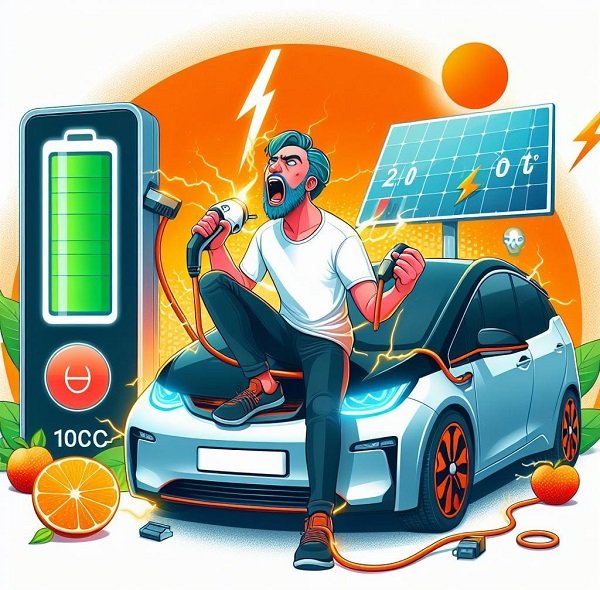The short answer is no, but it can accelerate battery degradation over time. For optimal life, aim for a 20–80% charge range. Occasional 100% is fine, but not ideal as a regular habit.
Electric vehicles (EVs) have emerged as the sustainable future of transportation, but concerns about battery health persist. One prevalent question echoes among EV owners: “Will charging my EV to 100% damage the battery?” In this article, we’ll explore this question, providing insights into EV battery details and dispelling common myths.
The Basics of Electric Vehicle Batteries
To understand the effects of charging to 100%, let’s start with the basics. EVs commonly utilise lithium-ion batteries, known for their energy density and longevity.
These batteries operate on the principle of lithium ions moving between positive and negative electrodes during charging and discharging. An integral part of this process is the Battery Management System (BMS), responsible for monitoring and optimising the battery’s performance.
Is it bad to charge EV to 100% : Myth vs. Reality
The myth of adverse consequences from fully charging batteries to 100% is disproved by real-world examples and scientific studies. Modern devices have advanced charging technologies that regulate the process and ensure optimal battery health.
Lithium-ion batteries show minimal capacity degradation when charged to their maximum capacity. Manufacturers design devices to handle full charges without detrimental effects, incorporating safety tools and intelligent charging algorithms.
Extreme temperatures and lengthy exposure to high charge levels are rare in everyday usage. Charging to 100% is safe as long as standard practices are followed and extreme conditions are avoided.
Understanding Battery Degradation

Battery degradation is influenced by factors like temperature and charging cycles. High temperatures can speed up chemical reactions, leading to faster deterioration. Minimising charging cycles can extend battery lifespan. Regular software updates are important for battery optimization.
Updates often include improvements that enhance efficiency and performance. They can reduce unnecessary battery drain and improve overall battery life. Keeping software up to date ensures optimal battery operation and minimises premature degradation.
Electric Vehicle Manufacturer Guidelines

Following manufacturer guidelines is crucial for optimal EV battery performance and longevity. These guidelines provide valuable recommendations and best practices that can significantly enhance battery lifespan and efficiency.
Case studies demonstrate the positive impact of adhering to manufacturer guidelines on battery longevity. Analysing these studies can provide valuable insights into the potential benefits of following the recommendations. User testimonials highlight the importance of following manufacturer recommendations.
Best Practices for Electric Vehicle Battery Health
To maintain your EV battery’s health, drive smoothly and avoid aggressive driving. Remove unnecessary weight from your vehicle to optimise efficiency. Protect your EV from extreme weather conditions. Install software updates provided by the manufacturer to improve battery management.
Understand your warranty and contact the manufacturer for assistance. By following these practices, you can maximise your EV battery’s lifespan and contribute to sustainability.
Balancing Act: Range vs. Battery Longevity
Achieving the perfect balance between range requirements and battery durability is a delicate balancing act for electric vehicle (EV) owners. EV owners must adopt strategies that allow them to optimise both the range of their vehicle and the lifespan of their battery.
By implementing smart charging practices, such as avoiding frequent fast charging and utilising scheduled charging during off-peak hours, EV owners can extend the longevity of their battery while still ensuring sufficient range for their daily needs.
Additionally, adopting efficient driving techniques, such as regenerative braking and maintaining a steady speed, can further enhance the range of the vehicle without compromising the battery’s health.
Future Innovations in Battery Technology
Ongoing battery research is driving future innovations, aiming to improve performance, efficiency, and lifespan, especially for electric vehicles (EVs). Future technologies are addressing limitations of current batteries, such as limited range and charging time for EVs.
Efforts include advanced materials, increased energy storage, and improved charging infrastructure. Advancements in battery technology, like solid-state batteries and intelligent management systems, can offer higher energy density, safety, faster charging, and optimised performance, contributing to a sustainable future.
Conclusion
In conclusion, charging an EV to 100% is not the bogeyman it’s often portrayed to be. Modern EVs are engineered to handle such charges, and manufacturers provide clear guidelines to optimise battery health.
By adopting responsible charging practices, staying informed about software updates, and embracing evolving battery technologies, EV owners can confidently navigate the road to a sustainable and worry-free future.



